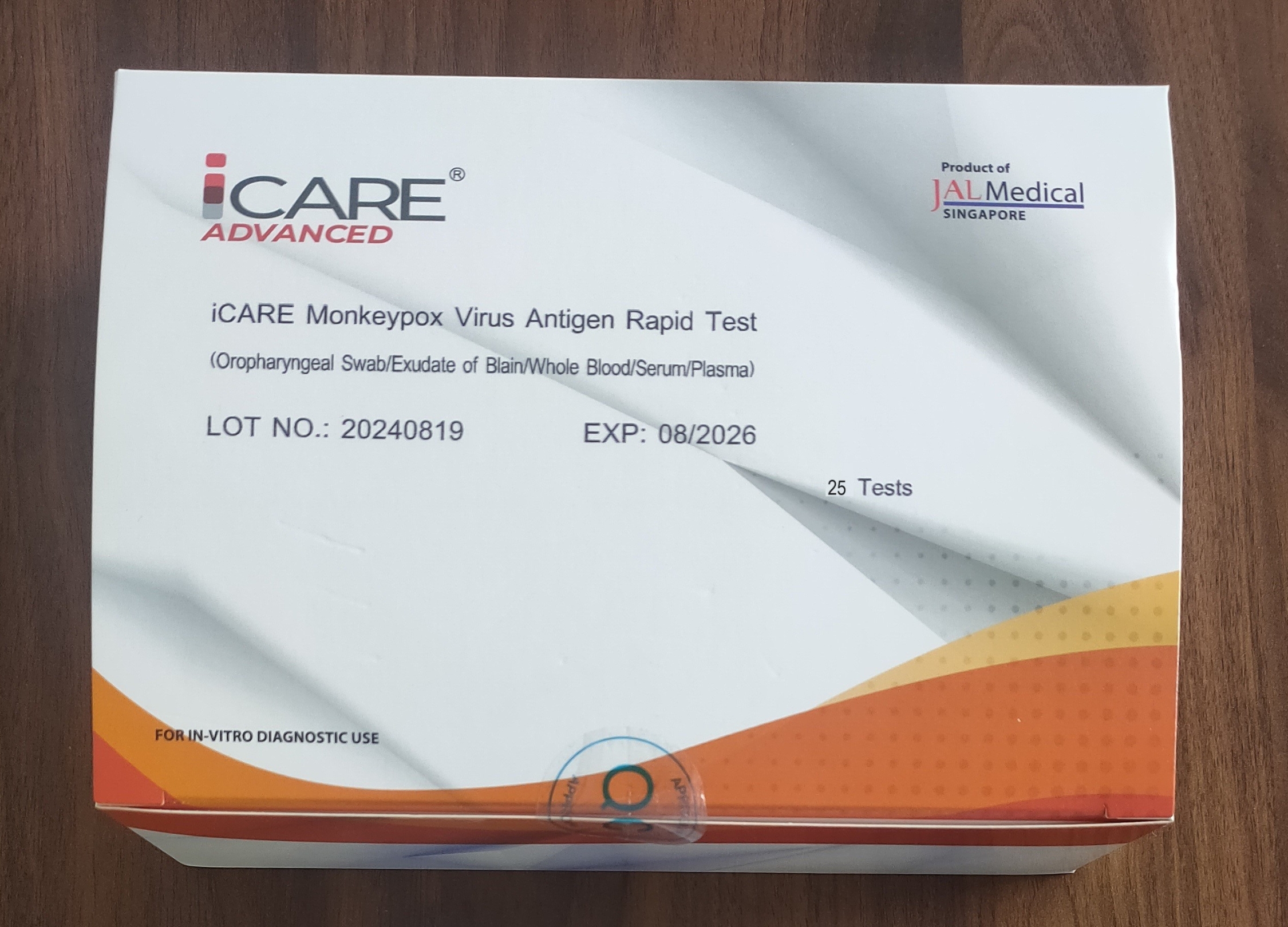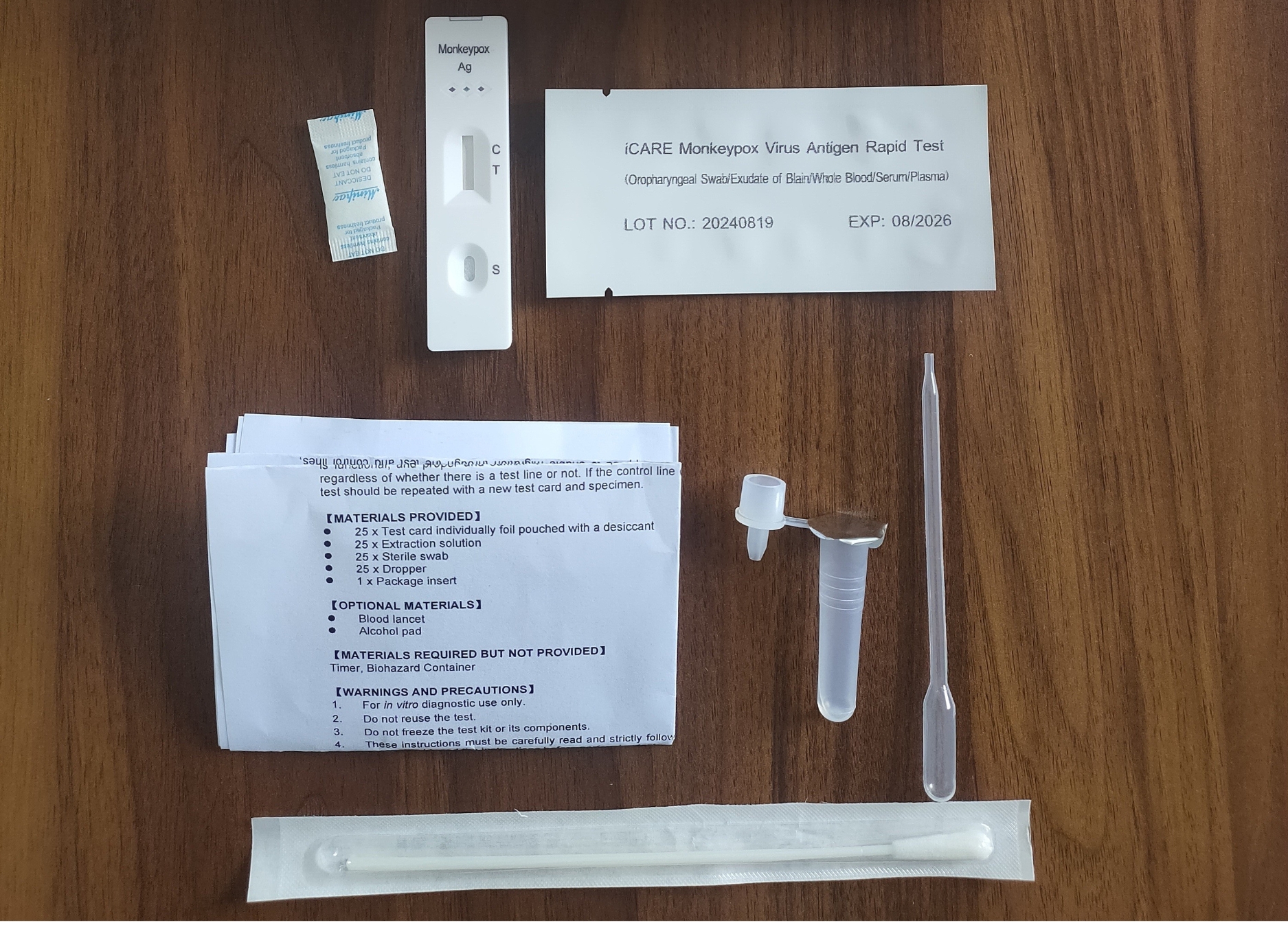Monkeypox is an emerging zoonotic disease caused by the Monkeypox virus, a relative of the Variola virus responsible for smallpox. Despite its rarity, recent outbreaks have raised global concerns due to the potential for rapid transmission. This article provides an in-depth understanding of the Monkeypox virus, its symptoms, preventive measures, and the critical role of tools like the iCare Monkeypox Virus Antigen Rapid Test in combating its spread.
What is Monkeypox?
Monkeypox is a viral disease first identified in 1958 among monkeys used for research. It is primarily transmitted to humans through direct contact with infected animals or contaminated materials. Human-to-human transmission occurs via respiratory droplets, skin lesions, or bodily fluids.
Monkeypox Virus
The Monkeypox virus belongs to the Orthopoxvirus genus and has two genetic clades:
- Central African Clade: More severe and transmissible.
- West African Clade: Typically less virulent but still poses significant health risks.
Monkeypox Symptoms
Monkeypox symptoms typically appear 5–21 days after exposure and may include:
- Fever
- Headache
- Muscle aches
- Fatigue
- Swollen lymph nodes (a key distinguishing feature from smallpox)
- Monkeypox rash, which progresses through macules, papules, vesicles, and pustules before scabbing.
Severe cases may involve complications like Monkeypox eye infections or Monkeypox conjunctivitis.
How is Monkeypox Diagnosed?
Rapid and accurate diagnosis is crucial for containing Monkeypox outbreaks. The use of tools like the Monkeypox Virus Antigen Rapid Test Kit has simplified the process, enabling early detection and treatment.
Key Diagnostic Tools
- iCare Monkeypox Virus Antigen Rapid Test: A reliable and user-friendly kit designed for quick results.
- Laboratory testing of blood or swab samples for confirmation.
Suppliers and Manufacturers
Kazakhstan collaborates with global Monkeypox Virus Rapid Test Kit Manufacturers and Suppliers to ensure adequate testing resources. Partnerships with Monkeypox Test Kit Exporters have also facilitated the availability of high-quality diagnostic tools.
Modes of Transmission
Monkeypox spreads through:
- Animal-to-Human Transmission: Direct contact with infected animals, particularly rodents.
- Human-to-Human Transmission: Prolonged close contact with an infected individual’s respiratory droplets, lesions, or bodily fluids.
- Indirect Transmission: Contact with contaminated surfaces or materials, such as clothing or bedding.
Monkeypox Prevention Strategies
1. Vaccination
The smallpox vaccine provides cross-protection against Monkeypox. Post-exposure vaccination can reduce the severity of symptoms.
2. Hygiene and Sanitation
- Wash hands frequently with soap and water.
- Avoid contact with potentially contaminated objects or surfaces.
3. Quarantine and Isolation
Isolate suspected or confirmed cases to prevent community transmission.
4. Rapid Testing
Employ tools like the iCare Monkeypox Virus Antigen Rapid Test for timely detection. Governments can work with Monkeypox Virus Rapid Test Kit Suppliers to ensure widespread availability.
Role of Rapid Test Kits in Prevention
Rapid test kits are pivotal in managing Monkeypox outbreaks. The Monkeypox Virus Antigen Rapid Test allows for early and accurate detection, enabling swift isolation and treatment of cases. Collaboration with Monkeypox Virus Test Kit Suppliers and Manufacturers ensures that these kits are accessible to both healthcare facilities and remote regions.
Global Monkeypox Outbreaks
Recent Monkeypox outbreaks have been reported in multiple countries, highlighting the virus’s ability to cross geographical boundaries. The rising demand for rapid diagnostic tools has led to increased production by Monkeypox Virus Rapid Test Kit Manufacturers and partnerships with Exporters to meet global needs.
Kazakhstan’s Preparedness for Monkeypox
Kazakhstan has adopted a proactive approach to Monkeypox preparedness:
- Stockpiling Test Kits: Procurement from Monkeypox Virus Antigen Rapid Test Suppliers ensures readiness for potential outbreaks.
- Awareness Campaigns: Public education on Monkeypox symptoms, prevention, and testing.
- Strengthening Healthcare Systems: Enhancing diagnostic capabilities with tools like the iCare Monkeypox Virus Antigen Rapid Test Kit.


Steps to Protect Yourself from Monkeypox
- Avoid Contact with Infected Individuals: Maintain physical distance from anyone showing symptoms.
- Personal Protective Equipment (PPE): Use masks and gloves when caring for infected individuals.
- Food Safety: Ensure meat is thoroughly cooked before consumption to avoid zoonotic transmission.
- Regular Testing: Use reliable tools such as the Monkeypox Virus Rapid Test Kit for early detection.
Challenges in Combating Monkeypox
1. Limited Awareness
Public knowledge about Monkeypox symptoms and prevention remains low. Increased educational efforts are essential.
2. Accessibility of Test Kits
Ensuring access to rapid test kits in rural and underserved areas requires collaboration with Monkeypox Virus Rapid Test Kit Exporters and local distributors.
3. Stigma
Fear and misinformation surrounding Monkeypox can lead to underreporting of cases, delaying containment efforts.
Advancements in Monkeypox Testing
The development of advanced diagnostic tools has transformed Monkeypox detection and management. Tools like the iCare Monkeypox Virus Antigen Rapid Test Kit are:
- Fast: Providing results in minutes.
- Accurate: Ensuring reliable diagnoses.
- Portable: Ideal for use in remote or resource-limited settings.
Partnerships with Monkeypox Virus Test Kit Manufacturers ensure continuous improvement in testing technology.
The Future of Monkeypox Prevention
1. Research and Development
Investing in vaccine development and improved diagnostic tools is crucial for long-term prevention.
2. Strengthening Healthcare Infrastructure
Expanding access to diagnostic kits through collaboration with Monkeypox Test Kit Manufacturers and Suppliers can enhance outbreak readiness.
3. Public Health Campaigns
Continuous education about Monkeypox symptoms, prevention, and treatment can reduce community spread and stigma.
Conclusion
Monkeypox poses a growing global threat, but with effective preventive measures, including hygiene, vaccination, and rapid testing, its spread can be controlled. Tools like the iCare Monkeypox Virus Antigen Rapid Test and collaborations with Monkeypox Virus Test Kit Suppliers play a vital role in early detection and management. By staying informed and vigilant, individuals and governments can work together to prevent future outbreaks.
FAQs
1. What are the primary symptoms of Monkeypox?
Monkeypox symptoms include fever, fatigue, swollen lymph nodes, and a characteristic rash that progresses through several stages.
2. How is Monkeypox diagnosed?
Monkeypox is diagnosed through laboratory testing of blood or swab samples. Rapid tests like the iCare Monkeypox Virus Antigen Rapid Test provide quick and accurate results.
3. Can Monkeypox be prevented?
Yes, preventive measures include vaccination, good hygiene practices, and early testing using tools like the Monkeypox Virus Rapid Test Kit.
4. Are there any vaccines for Monkeypox?
The smallpox vaccine offers protection against Monkeypox and can be administered post-exposure to reduce disease severity.
5. How can governments improve Monkeypox preparedness?
Governments can strengthen Monkeypox preparedness by stockpiling rapid test kits, launching awareness campaigns, and collaborating with Monkeypox Virus Rapid Test Kit Manufacturers.
Read More Articles on Moneybox Rapid Test Kit
Monkeypox Spread in Southern Africa: Socioeconomic and Environmental Factors
Impact Of Monkeypox On Travel And Tourism In North Africa
Monkeypox Spread in Southern Africa: Socioeconomic and Environmental Factors

